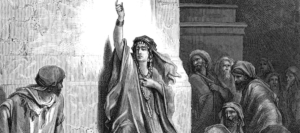“Do not follow the majority to do wrong”
לֹֽא־תִהְיֶ֥ה אַחֲרֵֽי־רַבִּ֖ים לְרָעֹ֑ת ׃ Exodus 23:2
Perhaps you remember hearing a parent warn you about the dangers of following the crowd. Children ask to engage in an activity because “everybody else is doing it!” In response, parents ask: “If everyone jumps off a cliff, will you follow them?” Such warnings teach us that blindly following others can lead to disaster.
This principle is deeply embedded in Jewish thought and law. The Torah explicitly commands: “You shall not follow a multitude to do evil” (Exodus 23:2). This verse underscores a fundamental Jewish value—moral integrity over societal pressure. It is human nature to seek acceptance and avoid standing out, but Judaism teaches that true righteousness requires standing firm against wrongdoing, even when the majority goes astray.
The Jewish people are a nation that stands apart, often at great cost. The Torah refers to Abraham, the first patriarch, as “HaIvri,” meaning “the one who crossed over.” Abraham rejected the prevailing idolatry of his time and followed the path of ethical monotheism. He did not conform to the norms of his society; instead, he set a new moral standard.
Jewish history is replete with examples of individuals who refused to follow the crowd when it led away from righteousness. The prophets of Israel, from Elijah to Jeremiah, stood against corruption and moral decay, calling the people back to justice and truth, despite facing hostility and persecution.
The Talmud further reinforces the idea that truth is not determined by majority opinion. There was a debate between Rabbi Eliezer against many sages. A heavenly voice declared Rabbi Eliezer correct, yet the majority ruled against him. Rabbi Joshua stood firm and declared, “It is not in heaven” (Bava Metzia 59b), emphasizing that Jewish law follows rigorous intellectual and moral debate rather than supernatural signs or popular opinion.
Modern psychology confirms the power of conformity, showing that people often adopt the views and behaviors of their peers, whether or not they align with their values. Yet Judaism encourages critical thinking and moral independence. The Jewish tradition of questioning, from the Passover Seder to yeshiva study, instills the courage to challenge norms and seek deeper truth.
Albert Einstein, a Jewish thinker and scientist, once said, “The person who follows the crowd will usually go no further than the crowd. The person who walks alone is likely to find himself in places no one has ever seen before.” This echoes the Jewish ideal of standing for truth, even in isolation.
Living by Jewish values often means resisting societal trends that conflict with Torah principles. Whether in matters of ethics, spirituality, or daily conduct, what is popular is not necessarily what is right. As Rabbi Israel Salanter, the founder of the Musar movement, taught, “The loudest voice is not always the voice of truth.”
We need to hear the message of Judaism at this time. Stand up for what you believe, even if you stand alone and against the crowd. In a world that pressures individuals to conform, the Torah says: do not follow the crowd to do evil. Instead, seek justice, pursue truth, and have the courage to stand firm in your convictions, even when standing alone.
Rabbi Evan J. Krame





